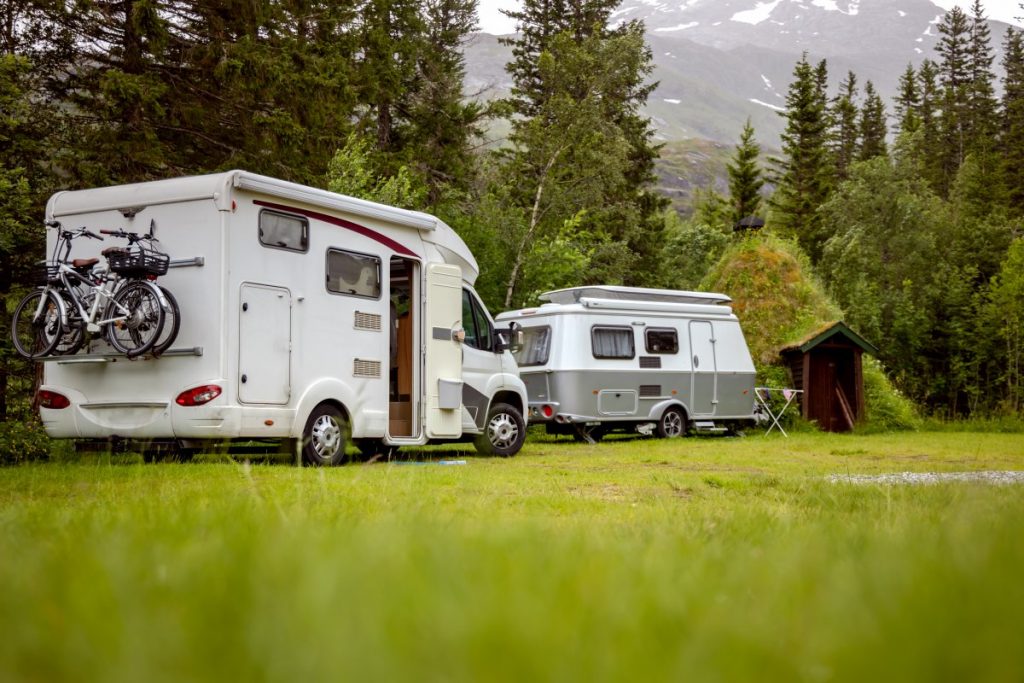RV insurance is a specialized form of insurance designed to cover the unique risks associated with this type of vehicle ownership. It includes liability for bodily injury or property damage caused by an accident, collision, and theft coverage for the RV itself and its contents inside, and roadside assistance in case of breakdowns or other mechanical issues.
RV insurance covers nearly all RVs, from motorhomes to pop-up campers to travel trailers. Coverage can include protection for personal items stored inside, such as tools, sporting equipment, camping gear, and electronics. It may also provide financial reimbursement for expenses related to a breakdown, like lodging and meals if you’re interested in the road. Some policies offer discounts for safety features like antitheft devices or anti-lock brakes.

Having the right RV insurance can help ensure you’re financially covered in accidents or mechanical failures while on the road. Knowing your family and belongings are safe during an unexpected traveling event also provides peace of mind. Understanding precisely what your policy covers can help you select the best plan for your specific needs, so read all terms and conditions thoroughly before deciding.
Whether you’re an experienced RVer or a rookie to the RV lifestyle, it’s always best to know what your insurance covers—especially when it comes to roof leaks. At the same time, most RV insurance policies will provide some coverage for a leaking roof. It is essential to understand the details of your policy and whether or not it covers all of the costs associated with such an issue.
Does RV Insurance Cover Roof Leaks?
Yes, RV insurance covers roof leaks if the roof is damaged during weather conditions or if you have proof of any accident. However, if the roof is damaged after damage and you do not have evidence of an accident, you will have a problem getting insurance coverage.
When it comes to roof leaks, insurance coverage typically varies depending on the specific policy you purchased. Generally speaking, your policy should cover repairs related to accidental damage caused by storms, vandalism, or other external sources. However, if you can prove that the roof leak was caused by poor maintenance or improper repair, then it’s likely that your insurer won’t pay for those costs. Additionally, some policies may require a deible before any claims are paid.
Regarding preventative maintenance measures and other proactive steps, you should do a few things to protect your RV from potential roof leaks. For starters, regularly inspect the seals around windows and doors and check for any signs of rust or damage. Additionally, gutters and downspouts must be cleaned out, and repairs must be made as quickly as possible if they become clogged or damaged. Lastly, investing in waterproof sealants to help guard against water intrusion can also help prevent future leaks.
RV insurance covers:
- Liability Coverage: This coverage is required in most states and protects if you cause an accident while driving your RV, resulting in bodily injury or property damage to others.
- Collision Coverage: This coverage pays for damage to your RV if involved in a collision, regardless of who is at fault.
- Comprehensive Coverage: This coverage pays for damage to your RV from non-collision events such as theft, fire, or weather-related incidents.
- Uninsured/Underinsured Motorist Coverage: This coverage protects you in case you are in an accident with someone who doesn’t have enough insurance to cover the damages.
- Personal Injury Protection: This coverage pays for medical expenses and lost wages for you and your passengers in case of an accident.
- Roadside Assistance: This coverage provides help if your RV breaks down on the road or you need help with a flat tire, lockout, or other issue.
- Vacation Liability Coverage: This coverage protects liability when you park your RV and use it as a temporary residence.
- Full-Timer Coverage: This coverage provides extended protection for RVers who use their RV as a full-time residence.
- Replacement Cost Coverage: This coverage pays for replacing your RV if it is totaled in an accident or stolen.
- Agreed Value Coverage: This coverage provides a fixed value for your RV in case of a total loss, regardless of its actual market value.
Overall, having insurance is one of the best ways to protect yourself financially if something like a roof leak does happen—however, there are specific steps you should take to keep yourself covered for certain situations such as those mentioned above. By taking the time to understand precisely what is and isn’t covered under an RV insurance policy and creating proper preventive maintenance procedures for your vehicle, you’ll be able to ensure that both you and your rig remain safe no matter what Mother Nature throws at you!
